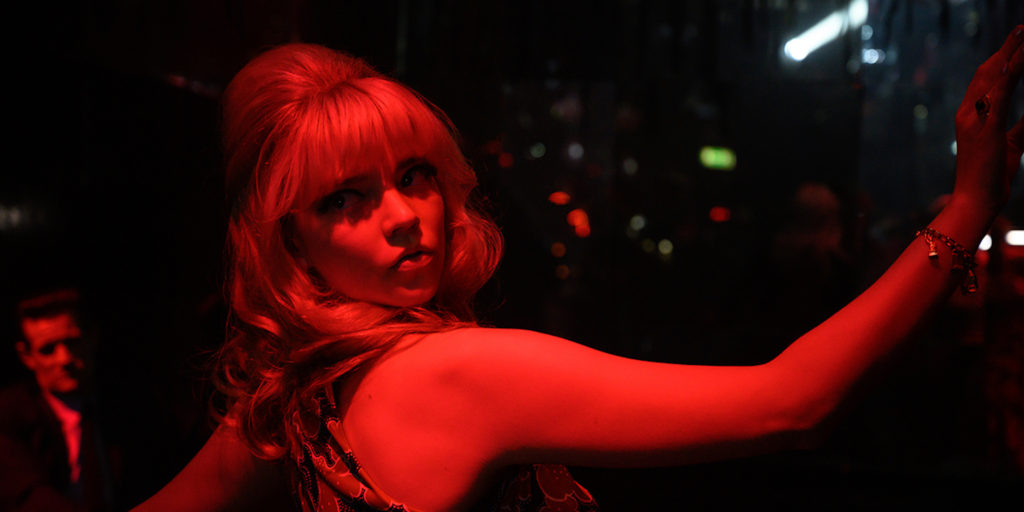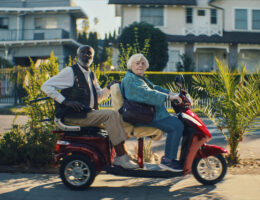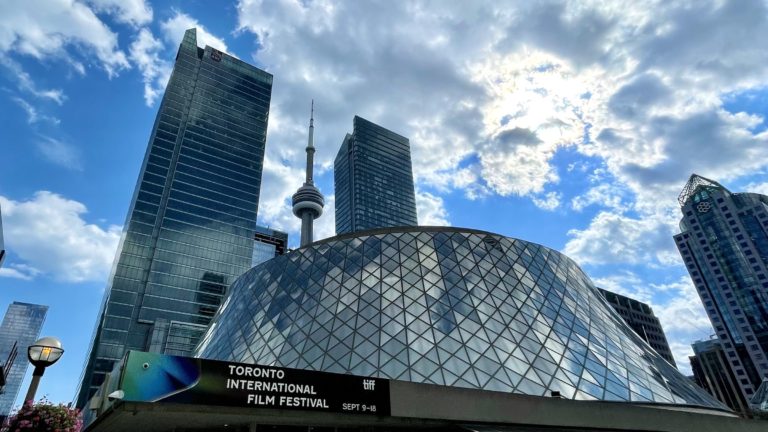This year’s Toronto Film Festival is back as a hybrid of in-person and digital screenings (most of the film premieres are limited to people in Canada, though some of the talks have fewer geographic limitations). Although Press and Industry have access to a wider range of films on the virtual platform, I perhaps foolishly made the decision to compensate for last year’s lockdown by attending a few days of opening weekend in-person.
It required transmitting vaccination information and quarantine planning to Canada in advance and getting a negative Covid-19 test result before even boarding the plane; so I was prepared for the whole thing to fall apart at the last minute. Alas, the stars (and my fondness for logistics) aligned; so I’ll be able to see some premieres on the big screens with other masked and vaccinated people. Unlike Telluride or your local cineplex, Toronto’s theaters have shuttered their concession stands, removing any temptation (or excuse) to lower your face covering even for a minute of “active” snacking during a screening.

Last Night in Soho (2021 | UK | Edgar Wright | 116 minutes)
Among the splashier [North American] premieres at this year’s festival is Edgar Wright’s Last Night in Soho, a spellbinding era-spanning horror movie with an unsurprisingly killer soundtrack and buckets of visual panache. Thomasin McKenzie makes the leap from her humble indie beginnings as a survivalist teen in Leave No Trace to play Eloise, a time-hopping fashion student in central London. When we meet her, dancing in her bedroom to records while wearing a ball gown made of newspapers, the rural setting just outside Cornwall and her choices for the turntable hide the fact that most of the action is set in the present-day. She just has a keen affinity for the classic style and music, having been raised by her grandmother in the wake of her own mother’s suicide.
Eloise’s move to the big city is a jarring. Danger lurks seemingly everywhere. On top of that, her new hyper-competitive roommate vies for Queen Bee of the college’s Mean Girls and is immediately both dismissive and threatened by the talents the so-called Country Mouse. As nightmarish as that housing situation seems, the reprieve of moving away from the horrors of dorm life to her own private bedsit is fleeting. The spacious room with a strict, if standoffish landlady (impeccable casting of the iconic Diana Rigg, in her final performance) and reasonable rent seems like a blessing. But kids, take this as a lesson: London is very cool city but there is no location so good or monthly rent so low that you should ever agree to live in a place that’s illuminated all night by a neighboring restaurant’s relentlessly flashing neon sign.
Her first days in the new place, though, are a true dream. As she dozes off to sleep, Eloise finds herself transported back to the swinging sixties. Padding through the street and into classic clubs in her pajamas, her counterpart in this mirror universe is Anya Taylor-Joy as an impossibly glamorous aspiring singer/dancer called Alexandra whose first meeting with a dashing manager (Matt Smith) promises a fast track to fame. Wright has tremendous fun with these fantastical overnight journeys through time, alternating between his stars and capturing the idealized mood of a young dreamer on the rise with glamorized period details, evocative music, and inventive camerawork that follows Alexandra into the clubs and alleys, onto stages, winning attention on the dance floor and finds Eloise popping into the role or being caught in reflections. It’s easy for viewers to get swept up in the fantasy; so it makes sense why Eloise would rather be lucid dreaming in the idealized past rather than in her complicated present. Her real life is quickly transformed by these nightly sojourns — she takes inspiration from them for her school design projects as well gaining confidence to reinvent her dull personal style into a flashy Alexandra doppelgänger.
Comments from her grandmother early in the film (and an appearance from her dead mother in the mirror) hint at a history of mental health issues; so we’re never sure what to make of Eloise’s growing infatuation with her nightly trips through time. Are they pure fantasies? Echoes of the past? Something in between? Like many a performer before her, Alexandra’s ascent to stardom takes a dark turn and Eloise has no choice but to follow this descent into the grime, manipulation, and sexual abuse lurking below her previously naive imaginings of an idealized era.
However, once the fun is over, the film’s momentum gets stalled and is struggles to recover. Unsettling visions of the past invade Eloise’s waking hours, causing her to behave erratically at school (shouldn’t any design academy have staff on constant watch for warning signs like Jenny Humphrey cosplay?), jeopardize her job at a West End pub (frequented by a seemingly creepy old timer who knows more than he lets on), and in her budding relationship with a classmate (Michael Ajao, burdened with a role defined purely by being “way too nice to his crush”).
Frankly, the film loses its way with this late descent into traumatic madness, bloody peril, and outright horror. Nightmarish visions invading the real world feel increasingly dull in comparison to the high style of the first dreamy segments and Eloise’s escalating responses to them are so heavy-handed that they weigh down the lightness earned earlier in the film. As the film veers toward some kind of ending slew of revelations, misdirects, and twists feel like overkill, if not desperate attempts to escape having followed too many alluring narrative threads down a dead end.
But when all’s said and done, Wright has so much style that you can almost forgive it when he runs out of substance and, instead of backtracking to fix it, commits to the madness and drives his two beguiling young stars right over a cliff on batshit fumes alone. It’s a heck of a ride, either way.




